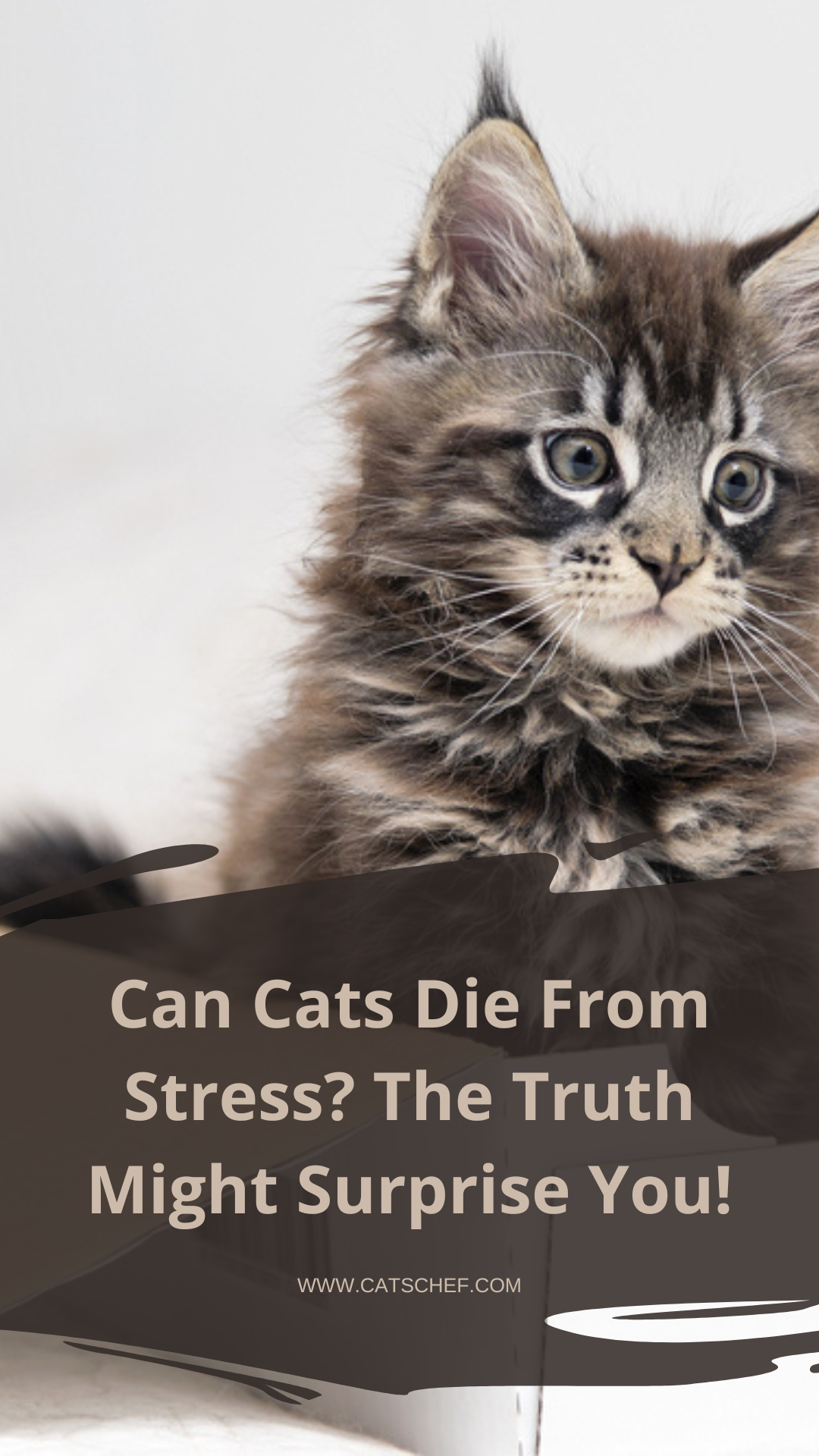We’re pretty sure everyone’s gone through the gut-wrenching moment of realization that cats aren’t always happy. Can cats die from stress, though?
When you notice your fluffy friend retreating to solitude, refusing to munch on Meow Mix, and overgrooming, you might start to overthink and overanalyze the situation. What did you do to make her that stressed out? Do you need to contact the vet? What do you do to help her?!
Worry not because we’ve all been there. Stressing out the moment something seems off, nudging her to eat, snuggle, and spend time with you even though she doesn’t want to, and calling everyone at 3 a.m. because she’s crying her little heart out.
We know that cats can get stressed out over the most mundane things, but we don’t know whether the stress affects them the same way it affects us. We’ve managed to gather a thing or two to ease your suffering, shed some light on your feline friend’s behavior, and offer you a solution. Read on!
Can cats get stressed out?

Unfortunately, cats can die from stress, but that depends on what type of stress they’re going through. Can cats get stressed out enough to experience physical and mental consequences, then?
When cats are stressed out, overwhelmed, and overstimulated, they’re known to go through a myriad of changes that affect the way they behave. Because of that, cats refuse to eat, drink, and sleep, run under the bed the moment someone utters something, and make strange sounds when they’re “threatened” or “under attack.”
Cats are both predators and prey, and some scientists believe that’s the reason why they’re prone to stress. They’re always keeping their guards up and trying to protect themselves from the enemy (the vacuum cleaner, the blowdryer, and even the mirror). But, there are two different types of stress to consider.
1. Acute stress
Acute stress occurs now and then and doesn’t affect your furry friend days, weeks, and months after the “incident.”
A car ride home, a booming, blaring party with too many people, or a rough meeting with the neighbor’s dogs might make your cat question your devotion to her, meow your ears off, and refuse to speak to your for days to come.
However, that’s temporary. Before you stop exposing your cat to new people, situations, or experiences, know that acute stress shouldn’t cause your cat any dangerous health problems or death.
Sure, she might get scared of the neighbor’s lawnmower and run away. But, acute stress won’t cause her to suffer, become depressed, and completely change the way she behaves and reacts to things.
2. Chronic stress
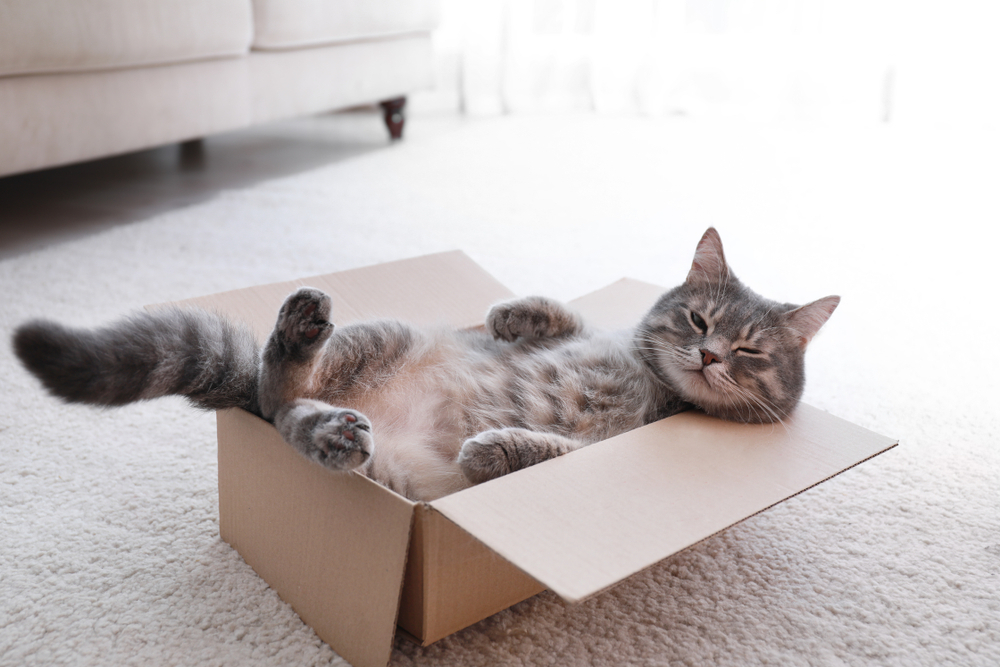
Chronic stress, on the other hand, might be a cause for concern. Chronic stress continues, recurs, and affects your furry friend every single day.
Maybe you’ve welcomed a baby that’s been crying for weeks on end, and causing everyone to act differently. Perhaps you’ve moved to a different neighborhood where your fluffer feels threatened. Or, there’s a chance you might have gotten another cat or a dog, and your cat’s been having a tough time getting used to the situation.
Whatever the case might be, the cause of chronic stress can’t be removed right away which means your cat’s fight-or-flight responses are off the charts at all times. Because of that, chronic stress affects your cat’s body negatively with time. What are the signs and symptoms of a stressed cat, though?
6 signs your cat is stressed out
1. Refusing to eat or drink
Cats don’t refuse Meow Mix, Fancy Feast, and chicken nuggets often.
But, when they do, they’re communicating that there’s something wrong. Before you try to give excuses and explanations for such strange behaviors, remember that cats can eat even when they’re not hungry because that’s one of the ways they’re taught to survive.
When your four-legged friend starts refusing to eat or drink, moping around, appearing weaker and weaker, and dropping weight, check whether she’s stressed out over something. Remove the cause of stress (when you can) and contact the vet.
2. Hiding under the bed, the table, or even the carpet
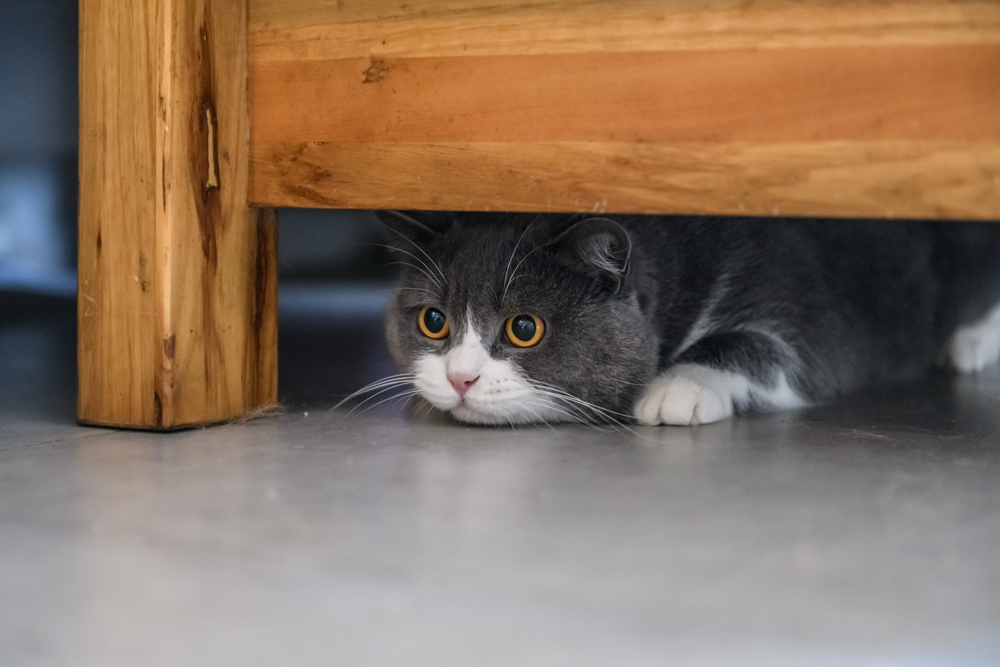
When your mischievous monster stops being her affectionate, appreciative self, running away from you, and hiding under different nooks and crannies, chances are that she’s stressed out.
While that might not sound as alarming as aggressive behavior or refusing to eat, cats are known to disappear for days when they’re threatened by something, overwhelmed, or overstimulated.
Whether or not that’s the case with your cat, don’t shy away from keeping an eye on her and making sure she doesn’t go somewhere you can’t reach or uncover. When you catch her attempting to escape, however, don’t bother her – provide her with enough food and water and wait for her to come out.
3. Meowing at all times
Meowing’s cute, right? Why would you be concerned with meowing?
Cats that are stressed out over something start producing strange sounds to get your attention, communicate what they’re going through, and beg for you to do something about whatever’s causing them distress and discomfort.
We wouldn’t describe such sounds as meowing, though, because they’re more reminiscent of yowling, howling, and even baby crying. When your cat starts voicing her concerns try to comfort her with cuddles, avert her attention with toys and games, or surprise her with a treat.
4. Snapping at you, biting you, or scratching your eyes out whenever you approach her
Nobody’s surprised that cats resort to aggressive behaviors when they’re stressed out.
Cats are rumored to be detached, reserved, and standoffish which attests to the fact that they’re willing to turn on you the moment something goes wrong. Cats are furry little fiends, aren’t they?
We’re kidding, we’re kidding. But, we’re not messin’ with you when we say that cats are known to attack when they’re overstimulated.
Whether you’re petting them without consent, forcing them to hang out with an animal they aren’t familiar with, or triggering them with pretty much anything, you can expect them to attack you.
When your cat starts showing signs of aggressive behavior, try to redirect her attention to something healthy. Play with her, take her for a walk, and reward her with a treat when she makes the switch.
5. Overgrooming
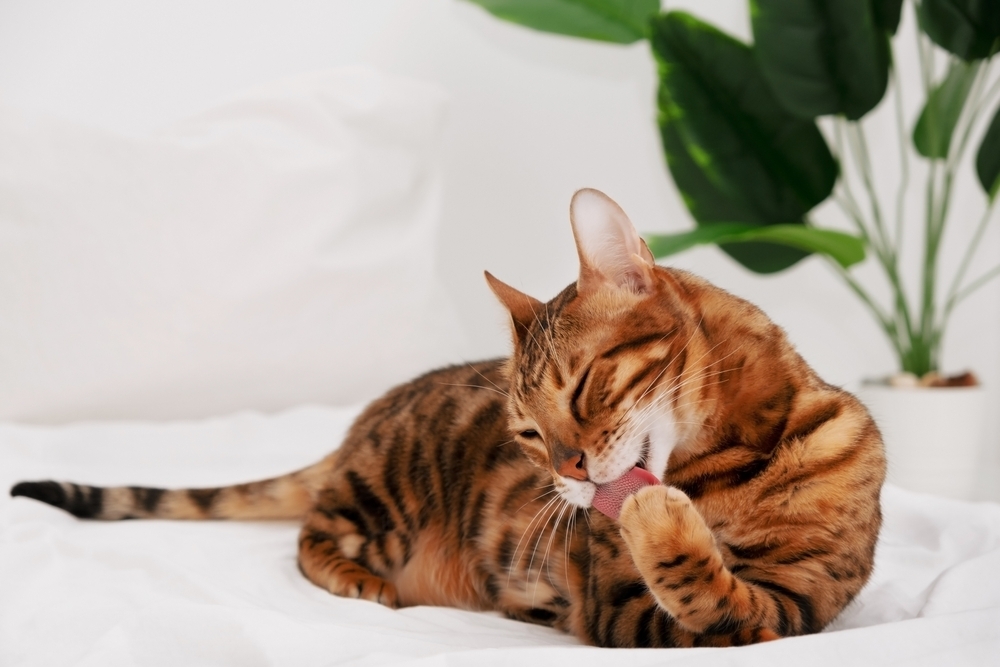
Stop stressing out over the prospect of your cat dying from stress. On the off chance that your cat’s been stressed out and overwhelmed enough to cause her dangerous health problems, you would’ve been the first to know and react.
Other than the signs and symptoms we’ve mentioned before, overgrooming’s a great way to check whether or not your cat’s been feeling off for a little while. Overgrooming (or sometimes not grooming at all) occurs as a response to stress because that’s something cats do to take care of themselves.
When they’re anxious, though, they’re too concerned with other things to care. Overgrooming can affect your cat’s health, and cause rashes, burns, bruises, and wounds. When you catch a glimpse of your cat grooming her coat for the tenth time that day, try to avert her attention to something else.
6. Pooping or peeing outside the litterbox
Oh, you would be surprised at the sheer amount of deets you can uncover about your cat by observing her litterbox behavior. Does she always pee and poop within the litterbox? Does she clean herself and her litterbox when she’s done? Or, does she go about her business outside the litterbox?
Sure, pooping and peeing outside the litterbox, next to a plant, or on the carpet might mean that you didn’t train your kitten to do that the right way. However, if you did, she might be doing that because she’s stressed out and overwhelmed. Before you discipline her, check for other signs and symptoms of stress and contact your vet.
What can you do to alleviate some of that stress?
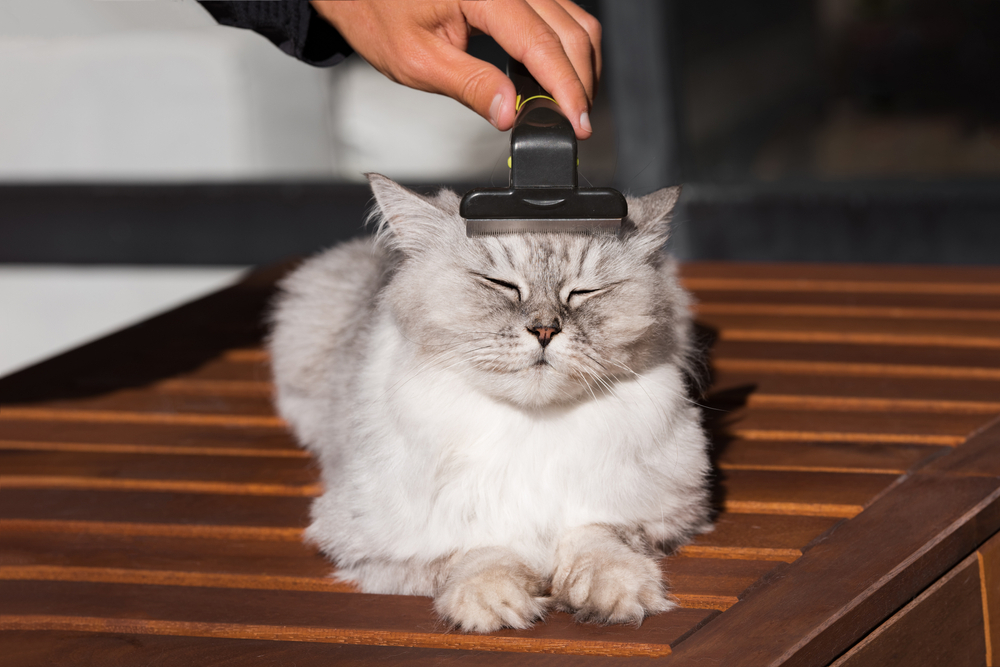
Figuring out what’s bothering your four-legged friend seems like a great place to start.
Whether she’s stressed out over something mundane or trying to get used to a huge change, you can react better when you know exactly what you’re reacting to. Furthermore, make sure to remove the source of stress ASAP – or, when you can’t do that, draw her attention to something she appreciates.
Other than that, you can always try your best to offer her a safe spot to rest, shower her with affection when she’s down, and show her enough compassion to ensure she knows she can turn to you whenever she’s overstimulated.
OK, can cats die from stress?
Cats can die from stress, but that doesn’t happen often enough for you to freak out over the prospects without any signs and symptoms to back your concerns. Acute stress won’t cause harm to your cat’s health, and chronic stress can be treated with care, medication, and a little help from your vet.
When push comes to shove, your cat needs you the same way you need an emotional support cat. We’re keeping our fingers crossed that you now know your cat’s triggers and cues a little better than before.
